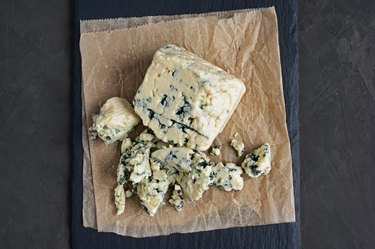
Is feta cheese a pregnancy risk? Are other kinds of goat cheese a pregnancy risk? Is pasteurized cheese always safe? These questions might not occur to you until you're pregnant, but they're important ones to explore in order to keep you and your baby safe when you're expecting. According to the American Pregnancy Association, Listeria bacteria in cheese is a special concern because they can lead to premature birth, miscarriage or infection.
1. Soft Cheese
Video of the Day
Soft cheeses should be avoided during pregnancy even if the label specifies "pasteurized cheese." With many soft cheeses, it's not always possible to tell if they have been pasteurized. Bon Appétit notes that there is a 60-day rule imposed by the U.S. Federal Department of Agriculture. The FDA requires that cheeses less than 60 days old must be pasteurized, while those just a few days older — even if it's the same cheese variety — can be unpasteurized.
Video of the Day
Even with soft cheese producers who use pasteurized milk, the lack of aging and heating can still allow bacteria to proliferate on soft cheese. For that reason, goat cheese pregnancy risks, including feta cheese pregnancy risks, are always a possibility. Other soft cheeses that should be avoided include Brie, Camembert, Manouri and Mexican queso blanco and queso fresco cheeses.
Good substitutes for spreadable soft cheeses include cream cheese, cottage cheese and processed cheese spread. Instead of soft Mexican queso cheese, use the aged, firm cheese known as queso enchilada.
2. Blue Cheese
Soft or semi-soft cheese that depends on mold for its flavor should also be avoided whether it's made from pasteurized or raw milk. These types include any type with "blue" or "bleu" in its name, such as Maytag blue. You'll also need to wait until after pregnancy to enjoy other mold-ripened blue cheeses such as Stilton, Roquefort and Gorgonzola.
If you're craving the strong flavor of blue cheese, consider trying slices of grating cheese types like Asiago, which also pack a pungent flavor.
3. Semi-Soft Pasteurized Cheese
Most semi-soft cheese is pasteurized. It's also less likely to harbor Listeria because it has less of the moisture content that's a breeding ground for bacteria. Use it within a week or two of opening the package.
This broad-ranging category of safe cheeses includes Monterey Jack, Port Salut and baby Gouda. In addition, there is no known Havarti pregnancy risk or concerns raised about mozzarella, unaged Provolone, Edam, Fontina or string cheese.
4. Semi-Firm Pasteurized Cheese
As you might expect, the texture of semi-firm cheese is somewhere between semi-soft and hard cheeses. In general, semi-firm types are great "cheese and crackers" snacks. Most melt well for cooking when sliced, grated or cubed. The Swiss types are famous for use in fondue pots or on a tabletop raclette grill.
For extra safety, especially during pregnancy, throw away the package if you haven't finished it within three weeks of opening the package. If it is a sliced variety, such as deli Swiss, throw it away within two weeks.
These safe pasteurized semi-firm cheeses include Asiago, Beaufort, cheddar, Comté, Colby, Edam, Gruyère, young Manchego and American Swiss. The international Swiss cheese types, which are also considered safe to consume during pregnancy, include Emmental, raclette, and Jarlsberg.
5. Hard Pasteurized Cheese
The firm, or hard, cheese types are perhaps most famous as grating cheeses, but they're also excellent when thinly shaved over salads and cooked greens. Because their taste is so pungent, a little goes a long way.
Hard cheeses are almost always pasteurized. In addition, they have so little moisture content that Listeria and other bacterial dangers are not considered significant. They can keep for at least two months in the refrigerator.
For that reason, Parmesan, Asiago and aged Gouda cheese pregnancy risks are not considered an issue. Other safe firm or hard cheeses include aged Provolone, Manchego, queso enchilada and Romano.